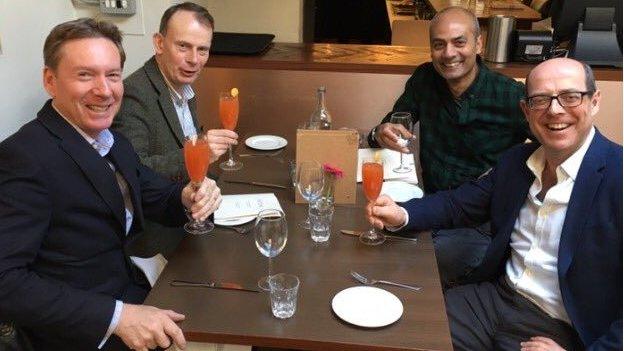First meeting of BBC 'Survivors' Club'
- Published

Clockwise (L to R): Frank Gardner, Andrew Marr, George Alagiah and Nick Robinson
It began as a throwaway line in a diary column I wrote to mark my traumatic return to full-time work at the BBC.
Traumatic because my debut on BBC Radio 4's Today programme was memorable largely for the scratchy sound of a voice struggling to cope with the demands I was making of it, after it was damaged in an otherwise highly successful operation to remove a tumour.
"I plan to cheer myself at the inaugural dinner of the Survivors' Club," I wrote referring to an idea my esteemed BBC colleague Frank Gardner (shot) had proposed to Andrew Marr (stroke), George Alagiah (cancer) and myself (cancer).
I wasn't sure that we would ever get round to breaking bread or supping wine, but wrote that I proposed that rule one of the club should state: "Talking about your medical condition is strictly prohibited."
Any breach would be punishable by picking up the bill.
This week I'm delighted to report that we had that inaugural meal - a lunch as it happens.
The photo of us toasting our survival has been shared by thousands on social media, external and we are all overwhelmed by the kindness and generosity of the comments people have added.
Rule breach
I'm afraid to say that we all breached rule one. However, no-one did so to complain about what they'd gone through - what would be the point when others had gone through so much worse?
No-one dwelt on what they could no longer do. There was, instead, good news to be shared about small steps in the recovery process, or of the absurdities and indignities that are faced daily by people who are unwell or disabled.
They are not my stories to tell but I now have in my mind the faces of airport security officials whose demands for the removal of vital medical equipment were greeted somewhat dustily.
What I think we all share is a sense of how lucky we have been.
Not to face a life-threatening illness - or in Frank's case to be shot - of course, but to have done so with superb medical support, the backing of family, friends and colleagues and public support on an extraordinary scale.
For some, illness is best faced in private with a stiff upper lip. For others, the pain and anxiety is lessened by sharing it. There is no right answer. Each must make their own decision.
Some of that choice is removed if you do the jobs we do.
There are many people - not least colleagues in the BBC - who face these challenges alone. Many too who are not so lucky with their recoveries.
Awkward question
However, I hope that knowing what we've been through and, to some extent, come through will help others facing a much lonelier struggle.
If that doesn't cheer you up, perhaps one Survivors' Club anecdote will.
A fellow broadcaster - no names I'm afraid - was asked by his doctor whether it was difficult to speak on TV while a producer said something completely different in your ear.
The inquiry came in the middle of an uncomfortable and intimate examination. The answer: "It's not nearly as difficult as talking to you when you've got your hand up my…."
Most of the time we did what four BBC employees gathered together always do - gossiped and bitched about our colleagues and bosses.
However, let me reassure you that no licence fees were spent that lunchtime.
Since we had all broken rule one, we split the bill.
Nick Robinson is a presenter on BBC Radio 4's Today programme and a former BBC political editor.